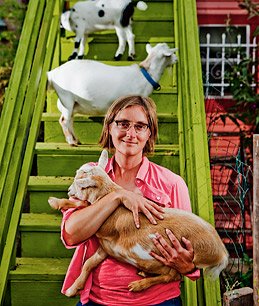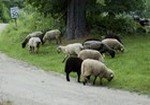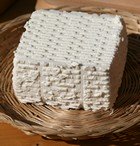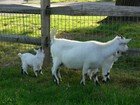Nigerian Dwarf Goats for Urban Farming and Homesteading
Nigerian dwarf goats grow to only 21 in. tall, about equal to a medium-size dog. "But they have giant udders," says Novella Carpenter. She should know: she has six goats that together provide a quart of milk a day, which she drinks and uses to make cheese and butter. And when the bleating beauties are not grazing in her 1,000-sq.-ft. yard, they're hanging out on the porch of her second-floor apartment in the middle of Oakland, Calif.
Carpenter, a city dweller
who in recent years has tried her
hand at raising turkeys (she got three day-old poults for $2 each) and
pigs (which she fattened to 300 lb.) for dinner, says she turned to
milk-producing goats because "I decided I needed a more long-term
relationship."
The author of the new Farm City: The Education of an
Urban Farmer, she is eager to help others get into what she describes
as a "hobby that involves sex and birth and death and life."
Novella
Carpenter who lives in Oakland,
California
pictured
with dwarf goats.
Picture by Mark Richards for TIME
Magazine.
 There have been lots of
stories lately about chicken coops
becoming a new urban and suburban accessory. But Carpenter
considers
the squawking hen "the urban-farming gateway animal," the first
occupant of a big metropolitan menagerie.
There have been lots of
stories lately about chicken coops
becoming a new urban and suburban accessory. But Carpenter
considers
the squawking hen "the urban-farming gateway animal," the first
occupant of a big metropolitan menagerie.
Among eco-foodies, the
hottest urban livestock bleat, quack, gobble, oink, buzz and ... well,
whatever noise rabbits make. Just ask the folks
at Seattle Tilth, a
composting
and gardening nonprofit
that this summer added goat sheds
and pens to its long-standing local chicken-coop tour.
Or ask the
participants in Detroit's Garden Resource Program, which
recently launched beekeeping classes and saw them fill up immediately. Even the so-called Chicken Whisperer, a.k.a. Andy Schneider, who hosts an urbane chicken radio show six days a week from suburban Atlanta, is branching out. He is planning an episode on turkeys after fielding so many questions about them from listeners. (Watch TIME's video "Barnyard Animals in Back Yards.")
But legal or not, urban animal husbandry is gaining cachet. That's not only because of the desire to eat local and organic but also because the shaky economy has more people wanting to be more self-sufficient. Says Seattle Tilth garden educator Carey Thornton: "Food you raise yourself just tastes better."
Most newbies keep chickens for eggs. Schneider's organization, Backyard Poultry, has groups in 19 cities in the U.S. and four outside the country; of the 700 members in Atlanta, for example, only five raise hens for consumption. Miniature goats are usually kept for milk and weed-eating; bees for honey and pollination.
But the truly hard-core urban farmers are plumping their animals for meat, shortening the food-supply chain and being responsible carnivores. "It's empowering," says Carpenter, who is nurturing 10 bunnies to eat. "People want to own their meat-eating."
Of course, not everyone wants to get that close to their food sources. Dwarf goats in particular have been a point of contention. They smell bad and can wreak havoc if they escape, opponents say; some also worry that allowing goats will pave the way for legalizing llamas and cows in cities. Goat advocates, who note that only horned males emit musk, say the ruminants are gentle enough to be walked on a leash and that they generate high-quality manure, which can be used as fertilizer.
The movement has led to heated debates in city-council meetings over the definitions of livestock, small animals and farm animals. The result: a hodgepodge of animal-ownership laws across the nation and even within a state. This spring in North Carolina, for example, Asheville voted to allow temporary permits for goats to clear vegetation, while Charlotte banned them from properties smaller than a quarter of an acre — despite supporters showing up at a city-council meeting with signs reading I LOVE MY PYGMY GOAT.
Those enthusiasts may have taken a page from the godmother of goat lovers, Jennie Grant, owner of Brownie and Snowflake, who founded the Goat Justice League two years ago while pushing Seattle to legalize miniature goats. It is now permissible to have three on a 5,000-sq.-ft. lot, and some city departments have hired goats to clear blackberry brambles. "Part of my lobbying effort included bringing fresh chevre to city-council members' offices," she says.
Locavore yuppies and suburban soccer moms aren't the only ones committing to animal husbandry. Catherine Ferguson Academy, a Detroit high school for teens who are pregnant or have already become mothers, has for years had a working farm adjacent to campus. The school considers gardening and raising animals integral to its curriculum. Under the tutelage of life-sciences teacher Paul Weertz, the young women built a barn one year and provide daily care for rabbits, horses, goats, chickens, ducks, turkeys and peacocks. The students recently acquired a pig and, says principal Asenath Andrews, they're going to eat it.
Andrews hopes farming teaches the girls to be more entrepreneurial, well-rounded moms. "Breast-feeding, which is definitely not a popular adolescent activity, is looked on differently by the girls who experience the lessons with baby rabbits," she says. A teachable moment happened the day students broke open an egg containing what appeared to be a viable chick, which the girls frantically tried to save, even calling in the school nurse. The chick died, but the episode sparked a thoughtful conversation about premature human babies, the risks they face and the possibility that saving ailing preemies isn't always merciful. It was one of her most fulfilling days as an educator, Andrews says. "If we have one of those discussions a year, it's worth having a goat — or 10 goats — at the school."
Of course, which animal is most valuable to the downtown farmer depends on whom you ask. "Rabbits are the ideal urban farm animal," says Carpenter, because "they can feed almost exclusively on Dumpstered items like lettuce, stale bread, etc." Seattle Tilth's Thornton thinks that ducks are better for gardens than chickens and that they provide tastier eggs. "I think the duck is the future," she says. Game on, chicken lovers.
By Jeninne Lee-St. John
Times Magazine, Monday, Aug. 17, 2009
How to Build a Milking Barn for 10 Goats
For some more plans on DIY visit our Do it yourself projects page.You can Add your Own Comments on Raising Goats!
We have lots of pages where you can contribute to throughout this website. We love hearing from our readers, and hope you will be one of those we hear from too. Feel free to add any comments related to raising goats or urban goats.
Leave a Comment
Do you have anything that you would like to add after reading this page? We would love to hear your thoughts. If you can add additional information to what has been written here you will be adding value to the website! No need to have any special skills - just type and submit. We will do the rest!









New! Comments
Do you have something of value to add? Leave me a comment in the box below.